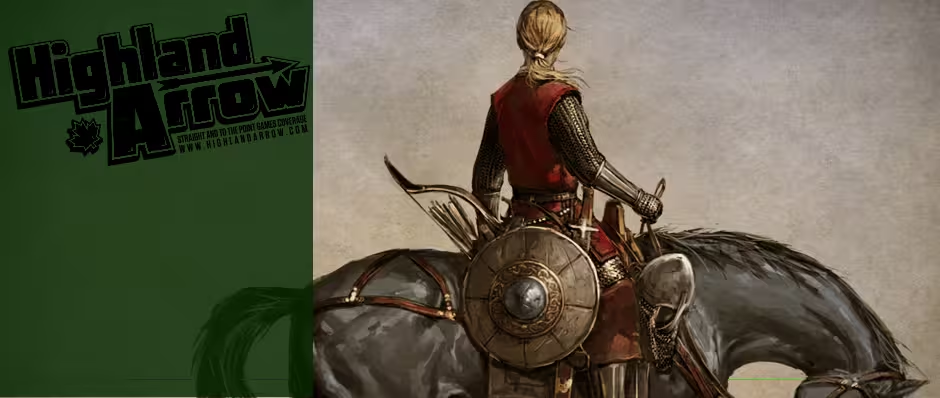

Mount & Blade: Warband
Platforms: PC
Reviewed on: PC
Reviewer: Maiyannah Bishop
Review Play-Time: 985h
Developer: Taleworlds Entertainment
Publisher: Paradox Interactive
Released: 2010-03-31
Review Published: 2014-11-19
Review Updated: 2021-12-22
+ Deep medieval simulator
+ Highly-engaging combat and tactical system
+ Great agency to direct player progression
+ Wide variety of unit types and characters
+ Absolutely brilliant modding support & community
- Low-fidelity graphics, even for the release date
- Some fighting aspects can be clunky
- Early game can be tedious and sometimes difficult
- Can be difficult to keep track of the great amount of
data floating around

Mount & Blade: Warband is a medieval combat simulator developed by TaleWorlds Entertainment and published by Paradox Interactive. Evoking memories of the long-past Darklands, Warband presents a unique combination of Total War-esque grand strategy, medieval life sim, and roleplaying hack and slash game. It's a unique blend of the three we hadn't seen since Darklands, and not really after Mount & Blade's release either, but it begs the question: is that with good reason?
It has the same strange dichotomy with the overworld map, town screeen, and tactical maps, but beyond that similarity - what is Mount and Blade: Warband? Come take a seat, dear reader. This is quite the game to take apart, so this is a longer review indeed, and I still somewhat fear I'll miss things.
Warband is a deep simulator: bring a canary
The first thing to be said about the game is that depth, and it is simultaneously Warband's greatest strength and most problematic feature. It provides a deeply-engaging world with a large amount of plots, friendships, rivalries, and opinions going around, and that interaction and relations systems is one of the key features of the game. Each of the lords, nations, cities, and villages you deal with each has their own opinion of you, and that opinion changes as you do tasks for them, fight them, and so forth, and this includes also interactions based on friendships - be a prick to someone's friend, and that affects their own opinion in a smaller way as well. Between this, the dearth of available quests, a simulated economy, and a wide variety of skills and weapon abilities to customise, you have a great deal of agency to direct your progression and play how you want. It's the Elite or Privateer thing - you can get by equally as well as a warlord, a merchant trader, a landowner, a vassal in the service to the King (or Queen) and more. You can even choose to rebel against the existing monarchy and found your own nation - but without establishing your right to rule beforehand through certain quests and actions, you will meet stiff resistance.
If just that paragraph seemed a bit grand, I'm not even scratching the surface. Let's take villages as the most basic example that they are. When you enter a village, you are greeted with a screen that lets you do all manner of things:
- Speak with the village elder, where you can buy cattle, supplies, or receive and complete procedurally-generated quests for the village.
- Walk around the village which puts you in the third person view where you can explore the village freely.
- Recruit volunteers which allows you to bolster your army.
- Buy and sell commodities and food.
- Perform a variety of hostile acts such as intimidating the villagers for supplies or burning down the village.
- If the village belongs to a hostile lord, you can also pay them to burn fields to provide a distraction to local defense forces.
You also have a chance to enter a village to find it is infested with outlaw bandits whom you must combat before you can do any of those things, and it's also possible to be ambushed by bandits trying to do any of those acts, no doubt hired by political opponents looking to secure your untimely demise. With the various lords (and ladies), bigger cities, castles, and wandering neutral parties such as bandits, merchants, and the like, and NPC companions you can pick up or hire, the game only gets all the deeper. While that depth is for the most part a good thing, it also brings us to the first problem.
A lot of the mechanics seem extraneous or only half thought-out
The problem with having a huge variety of mechanics is that some of them seem half-done. The most egregious example of that to me is the castle seige system. It sounds great, yeah? Have this big epic seige sounds great, and one might cause their mind to Crusader or the old Lords of the Realm series where you have these epic seiges complete with burning oil, siege machines, and the like. Well, that's one of the big ways Warband misses the mark. Each castle or town has a single way it is assaulted, either ladders or a seige tower - and when they say ladders, most of the castles actually have only a single ladder that an entire army is left trying to run up. It usually works about as well as you'd expect and makes those particular sieges an exercise in frustration. Beyond that however, not having proper siege equipment and such is something that I can understand the absence of in terms of the resources available to the developer, but it is nonetheless a huge missed opportunity to make the game truly stellar.
In general that's going to be be the problem that some people would find in the game - while there's a breadth of available things and some of them are quite detailed indeed, the missed opportunities like those sieges do stand out in an odd way. The game's emphasis is much more on a long term arc of doing quests and building relationships with different places and lords, and the individual quests or battles can sometimes seem a little empty, though I quite enjoy the open battles.
Open combat, especially between two large forces, feels and plays great,
small-scale or individual combat, markedly less so

Being able to amass that huge standing army of hundreds of troops is to many people the appeal of Mount & Blade: Warband and in many ways part of the long-term goal of a player, and the game certainly rewards that. With a fairly-robust system for ordering around troops in different categories, including groupings you can make yourself, from movement, to rules of engagement, to immediate commands, you can easily move and maneuver a large army around, and nothing is more visceral and grand than watching two large armies collide on those fields of battle, with sweeping terrain that more often than not rewards careful maneuvering of forces about that tactical map. The sound assets are brilliant and in the thick of it there very much is this feeling of being in the thick of a medieval melee.
In the smaller scale or individual combats is where the combat system falls apart, which is a bit of a problem, since most of the game time will be spent in the lead up to those big battles - and rebuilding armies after them. The melee combat is pretty simple, attacking in one of four "directions" to slash to either side, overhand, or thrust, and while this kind of simple combat makes it very easy to keep things engaging in the midst of a large melee, it lacks a lot of depth in the more personal combat. It's very easy to essentially stun-lock enemies who flinch after you hit them - or get stun-locked yourself - regardless of armour worn. Shields are useful for a short time, but often break rather quickly, even when facing enemies who don't have shield-breaking weapons. So even a highly-levelled player can get bashed around by the quicker-striking foes.
Special mention though is worth mentioning for the lance system, which presents a system for one versus one mounted combat that simulates the damage caused by the speed of the horse with such a lance weapon that is rather expertly done and adds some real mobility to the mounted combat against certain nations in the game that more heavily rely on cavalry.
Archery on the other hand is very skill-based, is fairly realistic in terms of drop off for both bows and crossbows, and you are well-rewarded for positioning archers in such a way to maximize the time they have to shoot prior to engagements. I actually have some personal experience in archery and while some of the finer points seem very simplified for the sake of the game, in a very broad sense that I feel is fairly authentic. There's also throwing weapons, which generally tend to penetrate armour better and are therefore are more damaging, but quite considerably limited in range comparatively.
All in all, with the great deal of weapon variety available, between one-handed and two-handed slashing, bludgeoning, and piercing weapons of all types, bows, arrows, and throwing weapons, as well as a great variety as well of different troop types utilising all manner of the various weapons available, the large-scale combat is a highly-tactical affair and feels grand indeed. It suffers a lot from more
The deepest fundamental problem with Warband is that it's a slow-burner
Warband takes a great while to get into full swing as a game. You start as a single person in a nation of your choice, and there are many, themed across different historical militaries, though the setting itself is a fantasy one. With the forests and beaches full of forest bandits and sea raiders respectively, your first order of business past the tutorial quest is starting to raise that army. The process of growing that army is slow however, requiring levelling your main character and leadership skill, and also your reknown, gained through successive combats (particularly with superior foes) to gain the ability to lead larger armies.
Now, in theory, I actually find this to be a fine system. Nothing that comes easily is something that feels all that rewarding and as such, the game requiring time and effort both to amass that army makes it feel like an accomplishment to be proud of, doubly so when you see it smash into an enemy force and be victorious. The pacing of it, however, is something that Mount & Blade seems to struggle with, and the various random quests will likely run thin for someone prior to the time where they've amassed that army. It thus lends the game to seeming a little repetitive, and I mention that because while I personally didn't have a problem with that, I know that there are those who will.
A fairly complex economy system is a touch of variety to the game as well
I feel I would be remiss if I did not mention that the game sports some variety above and beyond the usual combat, questing and such. There is quite the economy system, having varying prices of goods, based not on random fluctuation but upon on the real availability of goods from regular caravans - which you can raid for goods if you feel like being a bandit yourself, but there's also mission from the guilds to escort them, along with the possibility to build businesses in the different cities, one to a city, which produce goods that are sold every month (with income varying by the price of the goods they need) - or you can take and sell yourself, possibly for more, or less - at neighbouring cities. The old adage of buy low, sell high, certainly applies, and you can do the same thing buying raw goods from the villages and taking them back to the city to sell at a profit - or to provide cheaper commotities for your enterprise.
This building aspect extends to the military aspect as well, though that comes later in the game. If you come to control a village, city, or castle, either by serving a King (or Queen) and being granted it as a fief, or by taking it as an independent and holding it (easier written than done, definitely, but possible), you are given the option to build a variety of buildings that improve those fiefs, such as prisoner towers for castles which make escape much more difficult, or mills for villages that increases their productivity. It's another element of the game that adds some basic builder/management aspects that help offer some additional depth.
Food in particular is an interesting commodity, both in terms of your army and as a trading resource. You need to have food to feed yourself and your army, so stocking at least some in your inventory is necessary, and for the most part, it's not hard to keep up with - but you're rewarded for having a variety of food, best achieved by travelling to different areas and different cities. Having a good variety of food in your inventory gives a cumulative morale bonus that keeps your troops happy (unhappy troops may desert or revolt) and also keeps them at top health and they'll fight harder. There's also the ability to make a few food-related businesses, which are actually amidst the lowest-grossing businesses in terms of making you money, but they allow you to better support large armies, and also bring varieties of food to cities which may not have them usually available.
Other resources which you can bring to a city help it in not immediately-evident ways. Bringing tools into a town where there is a shortage of such will help speed up the production of new weapons and armour, for example, which adds new stock to the weaponsmith and armourer sellers quicker, for example. Likewise, iron to a city starved in such will also assist production. Things like ale and wine help improve the happiness of a city, and indeed, if you go to the pub you can buy everyone in the city that comes in a round to help improve your reputation in the city.
The pub itself serves as a sort of social hub for travelling specialty merchants, such as a ransom broker where you can sell prisoners, mercenaries you can hire to bolster your army, or companions you can hire as specialty followers, essentially the more traditional companions from Warband's RPG cousins. The tavernkeep can direct you to quests available in the vicinity as well, and there's some more, much rarer specialty sellers that I won't spoil here.
The game comes with a particularly powerful set of modding tools
Budding developers and designers will be glad to know that the game comes with the ability to change just anything about the game other than the core engine itself. The map, cities, villages, items you can buy, weapons, lords - all of those assets can be edited freely. While the tools aren't precisely newbie-friendly, they are not overly-complicated either, and there is a thriving community of mods from the small, such as simple mods that just add new items, give you higher-resolution textures, or new companion NPCs to hire, to the complex, such as the Me, Floris, or Brytenwalda mods that basically transform the entire world, progression systems, and quests.
These tools are so complex and accommodating that there are now three retail conversion releases out there: the standalone Caribbean! which is available on Steam Early Access and is essentially a pirates-themed total conversion mod of the game, and a forthcoming expansion module DLC Viking Conquest, as well the existing release Napoleanic Wars, all of which I might consider giving a short look at in the future.


